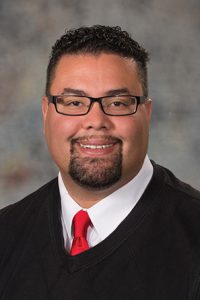Bill would eliminate waiting period on voting rights
Nebraskans who have been convicted of a felony would have their voting rights automatically restored upon completion of their sentence or probation under a bill considered Feb. 22 by the Government, Military and Veterans Affairs Committee.

Omaha Sen. Justin Wayne, sponsor of LB20, said the ability to engage in civic life reduces recidivism and that the current two-year waiting period is “arbitrary” and rooted in systemic racism. Even a small reduction in recidivism rates would save the state money, he said, and eliminating the waiting period is a matter of fairness.
Voting is a fundamental right, he said, and individuals who have been released from prison have served their time and should not continue to be punished.
“We don’t need to be the last state in the union to make this right,” Wayne said. “This issue addressed in the bill should neither be partisan nor controversial.”
Jasmine Harris of RISE — an organization that assists individuals recently released from prison — testified in support of the measure. Nebraska is one of only 11 states with post incarceration restrictions on voting, she said, and passage of LB20 would help remove the “invisible handcuffs” on the nearly 18,000 ex-felons in the state whose voting rights are restricted under current law.
“One of the keys of reentry well-being is positive social engagement,” Harris said. “Giving people the immediate right to vote after they complete their felony sentence or probation can help them feel like a part of the community — reinforcing the positive changes they have made in their lives — which leads them to be productive and their chances of recidivating decrease.”
Also testifying in favor was Daniel Gutman of the ACLU of Nebraska, who said the ability to vote immediately upon completion of a sentence would remove existing confusion about when individuals with felony convictions can vote.
Gutman cited a 2016 study done by the organization that found confusion among Nebraska election officials regarding the current rules, including several who thought the ban lasted for five years and one official who believed an individual had to be pardoned before voting rights could be restored.
“There is misinformation among well-meaning election officials who are trying to comply with the nuances of the current law,” he said. ”But even one mistake by an election official in this process is de facto disenfranchisement.”
Michelle Labaughne Feiling, a U.S. Army veteran on federal felony probation, also spoke in favor of LB20. She was released in 2020 after spending nine years in prison, she said, and now works full time at an Amazon fulfillment center and has been sober for six months.
“While I have been able to build a life I am proud of, it has not been easy,” Labaughne Feiling said. “Regaining the right to vote — a fundamental part of participating in a democracy — would give me and others with stories similar to mine additional motivation to stay on the right track.”
Testifying in opposition to the bill was Kathy Wilmot, who said she worked in the Kansas prison system for more than 20 years. She said the current two-year waiting period could help reinforce in former felons that voting rights are “special.”
“We know that individuals do place value on things that they [have to] work to attain,” Wilmot said.
The committee took no immediate action on LB20.

